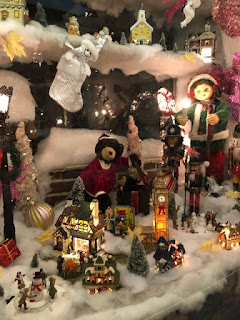Hanukkah began last night.
Many moons ago, I taught in a yeshiva. It was, to say the least, an interesting experience. The rabbis and students were Orthodox, but not Hasidic. So the boys--all of the students were boys--wore black ties and trousers with white shirts. Yarmulkes topped their heads. I dressed in a similar way--yes, I wore a yarmulke--when I was in the school.
You can imagine how I felt in such an atmosphere. I was still living as male, but struggled with my gender identity. The only female in the school--if you don't count me--was the secretary. She was the head rabbi's mother, and the head rabbi was not a young man!
I knew, probably, as much about Judaism as any non-Jew who grew up in Brooklyn would know--which is to say, more than most non-Jews in most other places, if I say so myself. Still, I had a lot of questions, especially when the holidays came around.
For one thing, I wanted to know about gift-giving customs. Many Reform and secular Jews celebrate Christmas and are just as extravagant about gifting and decorating as the Catholics I grew up with. But the head rabbi confirmed what I'd thought: the more Orthodox--which is to say, those who were less or not at all "co-opted" by American/Christian/Capitalist-consumerist culture, in the eyes of someone like the rabbi--followed the custom of giving gelt.
In the old Jewish communities of Europe, it was actual coinage, though most people today give chocolates shaped like coins and wrapped in gold-colored foil. The rabbi said that it probably started with the prohibition against accepting money for teaching the Torah, which led to giving those teachers--who, as you can imagine, are highly esteemed in their communities--gifts which, according to Halakhic law (most interpretations of it, anyway), are not the same as payment for teaching.
(I think the same sort of logic motivated my, and other kids', parents in giving gifts to the nuns who taught in the Catholic school I attended: In those days, they received only a very small amount of money to cover "personal expenses.")
My old head rabbi (Hmm, that's kind of an odd phrase for me, isn't it?) also suggested that the custom of giving gelt to teachers may have had something to do with language and semantics. What I didn't know, until he told me, is that Hanukkah actually means "dedication." The word for education is very similar: hinnukh.
Anyway, I wanted to ask him this: Does all of this mean that an Orthodox kid probably wouldn't get a bicycle for Hanukkah, but a Reform or secular kid might, for Hanukkah--or Christmas?
I did, however, on another occasion, ask him this: On shabat or high holy days, is it OK to ride a bicycle?
"The answer to that, like so many other questions, isn't black-and-white," he said. (How many times have I said that to my students?) But, he said, a purpose of shabat and the holy days is devotion, and anything that is a "distraction" from that should be avoided.
Of course, much is left to how one interprets the Torah--and, perhaps, the Hebrew language itself. Almost everyone agrees that one shouldn't "work" during those days. Some say that it simply means you shouldn't be doing whatever you do during normal business (or school) hours. Others, though, believe that anything that has a secular purpose is "work." So they, for example, have non-Jewish neighbors turn light switches on and off. Also, some traditional Jewish foods--most notably cholent (Think of it as a kosher cassoulet.), came about because the very orthodox believe you can't do anything related to food preparation once shabat or the holidays begin.
(To make cholent, people assembled pans of beans, potatoes, onions, meat, spices and whatever else they liked and, on their way to shul, either put it in their own ovens or left it with local bakers who had to keep their ovens lit on low heat. Those pans would be retrieved at the end of shabat.)
So, this rabbi opined, whether or not you can ride your bicycle depends on your (or your sect's) interpretration of the Torah--and why you are riding. Obviously, commuting would be out of the question. So would running errands, for some. But he said that cycling "might be OK" if it's "contemplative."















































